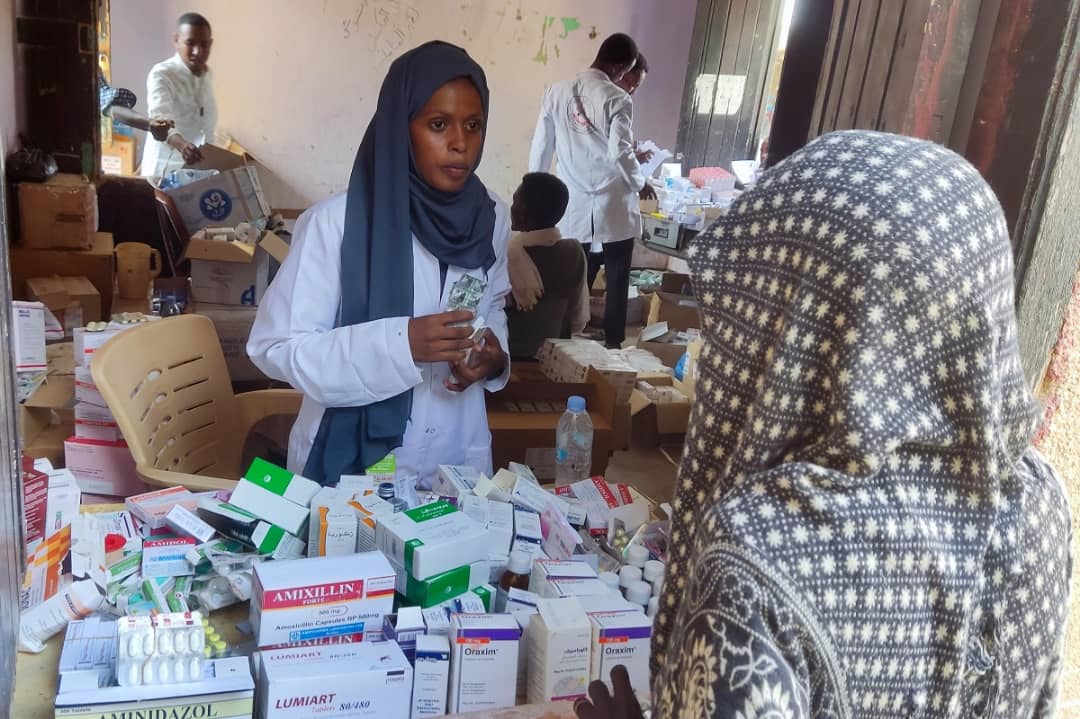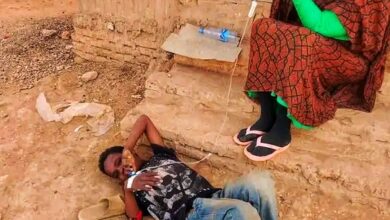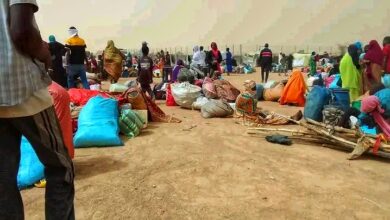
As Sudan’s war between the army and the Rapid Support Forces (RSF) enters its third year, the country’s health system continues to suffer catastrophic consequences. Warnings have been issued about the growing spread of diseases and epidemics, particularly with the upcoming rainy season expected to increase the breeding of disease-carrying vectors. This comes amid the collapse of hospitals and health centers, along with the breakdown of sanitation services.
Amid these conditions, a severe medicine crisis has emerged in the capital, especially in Khartoum, despite the army’s claim of regaining control over the city. The return of displaced people to their homes has led to a surge in demand for healthcare services, while more than 60% of pharmacies have been looted, and medicine warehouses have been damaged or destroyed.
Persistent Concern
According to activists in emergency response rooms, patients in Khartoum face ongoing anxiety in their search for functional hospitals and essential medicines. Many are forced to travel to Omdurman in the face of a worsening transportation crisis and rising costs.
Activists attributed the medicine shortage to possible governmental mismanagement and the hesitation of pharmaceutical investors to transport shipments to Khartoum due to looting risks and the lack of secure storage or purchasing power, as many have lost their livelihoods.
The Sudanese Ministry of Health reported that after two years of conflict, the health system has become one of the primary victims. It revealed that the health sector has sustained losses amounting to around $11 billion, with over 250 public and private hospitals rendered non-operational, including their buildings, equipment, ambulances, medicines, and medical supplies.
The Ministry noted that efforts are underway to gradually restore healthcare facilities, though the scale of destruction is immense.
Disease Outbreaks
Médecins Sans Frontières (Doctors Without Borders) reported outbreaks of several diseases in Sudan, including malaria, cholera, typhoid, diphtheria, acute watery diarrhea, and measles, caused by poor living conditions and the suspension of vaccination campaigns. The organization highlighted that approximately 60% of Sudan’s 49 million people are in need of humanitarian assistance, including healthcare, amid the total collapse of the health system.
Escalating Suffering
Suad Adam, a Khartoum resident who returned to Al-Sahafa after being displaced in River Nile State, recounted that before the war, the healthcare situation was stable and she was covered under health insurance for her diabetes and hypertension, receiving regular checkups, lab tests, and subsidized medication. However, the war led to the shutdown of the hospitals and health centers that once thrived in residential areas, leaving patients with no choice but to search for care elsewhere. Currently, only one hospital in Omdurman is providing treatment, and it is overwhelmed due to the large number of patients and shortage of facilities.
She added that upon returning to her neighborhood, she found residents in dire health conditions, facing widespread disease outbreaks, particularly malaria, cholera, and waterborne illnesses, along with chronic diseases. Medicines are unavailable or only found in Omdurman, which is relatively more stable, but transportation is costly and unreliable. Drug prices are soaring daily due to an unregulated black market, and many patients cannot afford the medicines they need because they have lost their sources of income.
Adam said the medicine crisis has forced people to resort to herbal remedies, such as soaking and drinking qarad (acacia pods) and hibiscus daily. While these do not cure malaria, they may alleviate fever symptoms. Those with chronic conditions like hypertension and diabetes are turning to cinnamon and harjal (wild basil) infusions. Although widely used, these are not medically proven treatments.
She expressed hope that the full liberation of Khartoum from RSF control and the restoration of security will help revive services, including access to food and medicine and the reopening of hospitals.
A Battleground
Walid Kamal Al-Din, a member of Khartoum’s Emergency Room, said residents are struggling with a lack of healthcare services as diseases and epidemics — particularly cholera, malaria, and dengue fever — continue to spread. The few operational hospitals suffer from a shortage of staff, equipment, and life-saving medicines. Residents in Jabal Awliya, in the far south of Khartoum, have taken to the streets with loudspeakers demanding the closure of ineffective health centers that no longer provide basic services or medication.
Kamal Al-Din noted that while some medicines are available in Omdurman, especially in hospitals that have been functioning throughout the war, access remains difficult due to the long distances—over 70 kilometers in some cases. Emergency response teams are working hard to assist patients with urgent medical needs, but their efforts are being hindered by systematic campaigns aimed at limiting their humanitarian activities. He emphasized that displaced people returning under these difficult conditions need greater support.
He stressed that the volunteer-run emergency response groups, formed during the war, have been providing crucial services to civilians under extraordinary circumstances and must be allowed to continue without interference until the situation stabilizes.
Shortages and Fears
Pharmacist Abu Ubaida Abdelghaffar blamed the medicine shortage on the fear pharmaceutical companies have of widespread looting in Khartoum. He explained that since the beginning of the conflict, many pharmacies were shut down and looted, and there are no longer secure storage facilities in the city.
He added that government-owned medical supply warehouses were also vandalized, resulting in the loss of medicines and medical supplies worth over $500 million. This has created a severe gap in the availability of medicines, especially as the country faces outbreaks of disease and the presence of decomposing bodies, with few functional hospitals.
Abdelghaffar concluded that the ongoing medicine shortage stems from pharmaceutical companies’ fears of sending supplies to Khartoum, even to areas now under government control, due to the lack of full police security. He emphasized the need for guarantees and protection to ensure safe and consistent medicine distribution.




